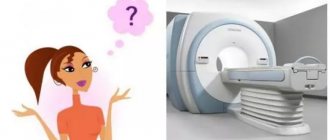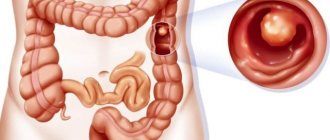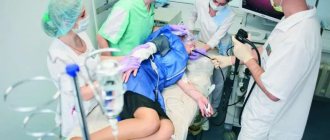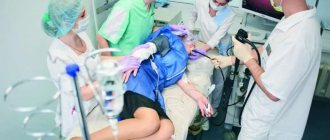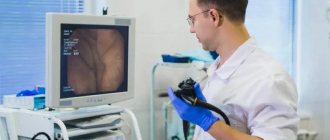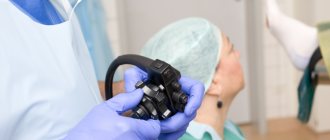Pros and cons of colonoscopy during menstruation
Menstruation is the natural end of the monthly reproductive cycle, during which eggs are produced and pregnancy can occur.
During bleeding, the uterus is freed from tissue that has completed its life cycle. According to established medical requirements, women are not recommended to exercise during menstruation, and doctors also recommend avoiding stress. Colonoscopy is a specific intracavitary examination of the large intestine using a colonoscope inserted into the intestinal lumen. Safe insertion is achieved by using a small stream of air to open the intestine. This feature of the procedure causes false urge to stool, and also causes discomfort, which during menstruation can develop into significant nagging pain.
Features of the procedure
Performing a colonoscopy during menstruation is associated with a number of inconveniences:
- firstly, there are problems of an aesthetic and hygienic nature. During the procedure, the use of Tampax tampons with five drops is required to prevent contact of the colonoscope with menstrual blood and provide the doctor with the necessary conditions for working for a long time;
- secondly, if it is likely that the procedure will be carried out during menstruation, the doctor needs to do a preliminary ultrasound examination and determine whether the patient is suffering from adhesions of the pelvic organs. In this case, the procedure may have complications and cause significant pain if there are adhesions between the reproductive organs and the intestines, especially during menstruation;
- thirdly, endoscopic intestinal surgery to remove a polyp can cause bleeding and severe blood loss;
- fourthly, when tumors in the intestines are removed during menstruation, the risks of complications in women suffering from chronic inflammatory processes in the pelvic organs increase.
If for some reason the procedure is likely to be performed during menstruation, the doctor needs to exclude a number of additional pathological processes;
- establish the presence of adhesions of the pelvic organs in the patient. This can be done by a simple survey (during menstruation, in the presence of adhesions, mild gastrointestinal upset occurs) or through a gynecological examination;
- conduct an ultrasound examination and exclude the presence of chronic adnexitis in the patient. Otherwise, colonoscopy is prescribed strictly in the first phase of the cycle with the support of anti-inflammatory drugs;
- It is advisable not to remove polyps during menstruation. It is recommended to perform the procedure without invasive intervention, only examination.
This test is performed if the patient is likely to menstruate, but it is not known when bleeding will begin. For this reason, the proctologist may prescribe the use of additional sedation to reduce pain at the onset of menstruation. Antibiotics are prescribed to stop the inflammatory process.
In some cases, when performing a colonoscopy after the 20th day of the menstrual cycle, an earlier onset of menstruation can be provoked. In this case, the patient should have the necessary hygiene items with her.
Why is this procedure so popular?
Thanks to colonoscopy, it has become possible to detect various tumors in the colon. This method is much more effective than others, as it allows you to detect cancer at an early stage, polyps and other neoplasms, even in the most inaccessible places. The procedure gained such capabilities thanks to the highly sensitive probe of the colonoscope. Its length reaches 160 cm and allows you to examine most of the intestine. The procedure, performed by an endoscopist or proctologist, is absolutely safe and minimizes the possibility of internal burns, since cold light is used.
The duration of the study is no more than half an hour
. The procedure is usually completed by reaching the cecum. The probe is inserted into the anus manually and the advancement of the flexible tube is accompanied by air supply. In this case, the doctor controls the position of the device by palpation of the abdomen.
On what days of the menstrual cycle is the procedure allowed?
To exclude a negative impact on the female reproductive cycle, colonoscopy is prescribed from 6 to 12 days of the cycle. Before possible ovulation.
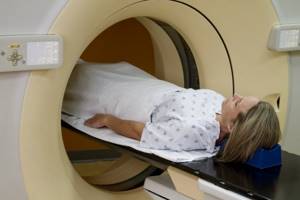
If necessary, procedures can be carried out from days 12 to 19, when ovulation usually occurs. At the same time, the gynecologist is informed about the ongoing invasion, who must exclude the negative consequences of the anovulatory cycle and the appearance of a follicular cyst. Starting from the 20th day of the monthly cycle, the procedure is not recommended to prevent premature onset of monthly bleeding.
Another time
And if 2-3 days after the end of menstruation are missed, can a woman have a colposcopy at another time?
It can also be done after ovulation. At this time, the cervical canal is filled with a large amount of mucus, which interferes with the analysis. As a result, its results are distorted and cannot be considered accurate. And after this the analysis will be more effective.
Also, a representative of the fair sex should not carry out the procedure in the second half of the menstrual cycle, since at this time its consequences will be somewhat more complex. The fact is that the mucous membrane of the organ takes longer to heal after ovulation due to the slow pace of regeneration processes.
Preparing for a colonoscopy during menstruation
If, for a forced reason, a colonoscopy is performed during menstruation, the woman must prepare in advance. In addition to the desirable maintenance course of antibiotics, which reduces the risks of complications in chronic adnexitis, it is necessary to start taking sedatives a few days in advance. This will normalize the hormonal cycle and make menstruation less painful during dysmenorrhea. During menstrual colonoscopy, additional sedation is recommended, and if the woman desires, general anesthesia is given.
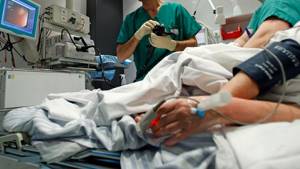
It is necessary to provide for hygienic complications:
- first of all, you need to have thick sanitary pads, a special diaper, Tampax tampons for 5 drops and wet sanitary antibacterial wipes;
- Before the procedure, visit the bathroom and change the tampon for a new one, empty your bladder. Clean the anal and genital area with a damp cloth;
- In the doctor's office, wear disposable procedure panties if you experience discomfort;
- Place a pad close to you if the bleeding increases and the tampon in place is not enough to absorb all the blood.
During the procedure, relax as much as possible to avoid muscle colic. In this case, the pain will be minimal.
Preliminary preparation
Before performing a colonoscopy, in addition to the described measures related to the possible onset of menstruation, the intestines are cleaned of feces. To minimize complications associated with sluggish infectious processes, it is recommended to additionally perform cleansing procedures:
Preparing for a colonoscopy:
- antiparasitic course: for 5 days, take 5 tablets of albendazole, which is active against trematodes and round parasites, with fatty foods. Before colon cleansing, it is recommended to take a dose of biltricide against tape parasites. After bowel movements, take Hilak, Canadian yogurt, and a dose of the drug Enterozermina. The course is carried out under the supervision of a doctor;
- in case of possible complications, the proctologist prescribes antibiotics that are active against pathogenic intestinal flora. To find out the active drug, before the examination you can do a bacterial culture of the intestinal microflora with an antibiogram;
- In addition to antibiotics, to prevent complications after surgery to remove polyps, to increase local immunity, rectal placement of Galavit suppositories is recommended for 5 days before the date of colonoscopy and for 5 days after. This drug is good at restoring epithelium damaged by endoscopic intervention;
- to eliminate fermentation processes in the intestines, take Espumisan. Also avoid milk before your colonoscopy.
This therapeutic therapy is supportive and is prescribed when there are risks of complications, possible removal of polyps from the intestines, tissue sampling for biopsy and colonoscopy during menstruation. The medical approach allows you to combine treatment procedures with examination with minimal risks of inflammatory processes after endoscopic surgery.
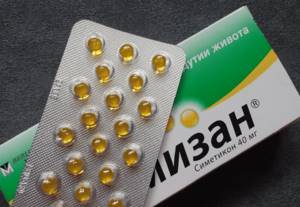
How is the procedure done?
Some nuances may differ depending on the clinic and doctor, but, in general, all the basics are the same.
Patient preparation
For a normal colonoscopy, you will need to thoroughly clean the intestines and ensure that they are in a calm state without bloating. To this end, doctors recommend the following measures:
- In 5-7 days you need to remove foods that cause flatulence from your diet. This is fresh white bread, whole milk, rich pastries, many sweets, legumes, uncooked vegetables and fruits.
- If you have constipation, you should avoid foods high in fiber. These include raw fruits and vegetables, bran, whole grains, muesli, and bread.
- For three days, you need to give up alcohol, fatty foods, overeating, and some medications (in consultation with your doctor).
- The day before the colonoscopy, a fasting period begins when you can only drink. Drinks may be clear. If juices, then without pulp. Usually the doctor prescribes the use of special laxative solutions. Some need to be drunk in large quantities. For others, about 200 ml is enough. They dilute stool, enhance contraction of the intestinal walls and ensure its rapid and complete cleansing.
- The enema is performed in a hospital or the patient is asked to do it themselves.
Attention! Smoking on the day of the procedure is not recommended, both before and after.
Do you need anesthesia?
Colonoscopy is unpleasant and painful. According to patient reviews, some bravely endured the procedure “alive,” while others struggled and climbed the wall. Of course, the second option is caused by fear, and not by real sensations. Some doctors justify their refusal of anesthesia by the fact that they need the patient's reaction and interaction with him during the procedure. But in the main program about medicine with Elena Malysheva, experienced gastroenterologist Gorodokin I.V. refutes such a need. He believes that it is better to undergo a colonoscopy without suffering with the help of medical sleep. This is a special form of anesthesia when a person sleeps very deeply and does not feel anything. At the same time, awakening is quick without consequences, as after general anesthesia. This process is called sedation.
Attention! Pain relief during colonoscopy is not practiced everywhere. Therefore, the patient should discuss this point in advance with the doctor who will perform the manipulations.
Procedure
All actions in the intestines are carried out under the control of a light device and a video camera:
- The patient is placed on his side and asked to bend his legs.
- Anesthesia is given.
- The tip of the colonoscope is smooth, but it is additionally lubricated for easy passage.
- The intestines are slightly pumped with air to straighten the folds and see everything.
- If feces or food remains remain somewhere, rinse with a stream of water.
- Step by step, the doctor examines the rectum, and then the large intestine.
- A biopsy is taken from suspicious areas of the epithelium.
- Polyps are removed with endoloops and sent for histology.
- Remove instruments, pump out air and liquid.
- They wake up the patient.
What happens after the colonoscopy is completed?
After the procedure, the person recovers immediately. But if you are particularly sensitive and in poor health, you may remain under medical supervision for up to 2 hours. All instruments are created in such a way that injury during colonoscopy is almost impossible. As a result of scraping the mucous membrane or removing a polyp during the procedure, a small amount of ichor is sometimes noted. This is fine. In case of heavy discharge, you should consult a doctor. There may be some swelling due to the remaining air. It is recommended to start eating with gentle dishes - soups, cereals, fermented milk products.
Possible consequences
Possible consequences that may occur after a colonoscopy include all sorts of complications that arise due to insufficient preparation of the patient for endoscopic surgery.
The most common consequences of a conditionally pathological and natural nature include:
- weakness after the procedure, especially under general anesthesia, and the need to restore vitality. Bed rest for 1-2 days is recommended. Recovery can last up to 10-14 days;
- pain in the pelvic area for several days after colonoscopy in the presence of a progressive adhesive process;
- anovulatory monthly cycle and the appearance of a follicular cyst during invasion from the 12th to the 19th day of the monthly cycle (passes spontaneously the next month);
- an inflammatory process after removal of a polyp is possible due to insufficient preparation of a patient with chronic inflammatory diseases;
- bleeding at the site of removal of a polyp or possible cracks usually resolves spontaneously if the patient remains in bed and does not exercise for 10-14 days;
- disruption of digestive processes; to eliminate them, it is recommended to take probiotics; simultaneous intake of milk is prohibited.
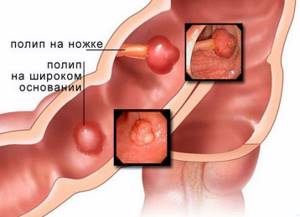
Opinion of medical specialists
A colonoscopy during menstruation is not advisable. Menstruation is a relative contraindication. The procedure can be performed as needed, but it requires a special approach to examining the intestine, preparation “before” and recovery “after” endoscopic surgery. This usually entails additional inconvenience and expense for the woman, so the procedure is carried out from 6 to 12 days of the monthly cycle, excluding the effect on cyclic hormonal processes.
When performing a colonoscopy, experts recommend avoiding sexual intercourse or using protection. The procedure can cause spontaneous abortion during pregnancy.
Many doctors recommend undergoing a colonoscopy as a preventive examination in a hospital, combining endoscopic intervention with therapeutic and preventive measures to cleanse the gastrointestinal tract. In this case, the consequences are minimized. Keeping the patient in the hospital allows for comprehensive care for the patient during the procedure, proper rest and bed rest with the use of sedatives. No one will bother you, you will be able to fully recover after the operation.
Planning any endoscopic intervention should be taken seriously and all associated factors should be considered. For examination, choose a clinic that has significant experience in this type of research and operations, in this case the procedure will go unnoticed and painlessly. At the same time, your intestines and gastrointestinal tract will be cleansed of toxins, which will have a good effect on immunity, general well-being and skin quality.
Memo table: rules for performing colonoscopy during menstruation
| Recommendations | Effect on colonoscopy during menstruation | Peculiarities |
| Preparation 2 weeks before colonoscopy | ||
| Antiparasitic course | Helps eliminate parasites that cause intestinal inflammation and disorders. At the same time, the microflora is restored. | A course of albendazole and biltricide, followed by probiotics. |
| Anti-inflammatory course for the treatment of intestinal infectious processes | For chronic inflammatory processes. | The drug is selected based on the bacterial culture antibiogram. |
| Preparation for endoscopic examination and removal of polyps | A course of immunostimulants affecting the restoration of the epithelium | Galavit suppositories, rectally - 5 days before the procedure, 5 days after. It has a general healing effect, including the female reproductive organs. |
| Prevention of colitis and gas formation | Preparing for a colonoscopy | Taking Espumisan. |
| Diet | Preparing for the procedure and cleaning the gastrointestinal tract | Switch to a liquid vegetable diet 2 weeks before the procedure. |
| Eliminate milk from your diet | To prevent gas formation | Do not consume milk when taking probiotics. |
| Cleanse the intestines before the procedure | Removal of feces | Using the drug Fortrans. |
| Preparation on the day of the procedure | ||
| Take painkillers | To eliminate discomfort from menstruation | Nimesil |
| Place tampon Tampax 5 drops | To prevent increased bleeding | Immediately before the procedure. |
| Prepare bulky feminine pads | To create comfortable working conditions for the doctor in case of increased bleeding | Bring pads with you to the treatment room. |
Additionally, you can consult your gynecologist and receive personal recommendations.
How to protect yourself from menstruation during a colonoscopy?
The pharmacy sells special disposable panties for the procedure with an opening at the anus. You can attach a sanitary pad to them. To select the size, it is enough to know your waist circumference. For heavy discharge, especially in the first days of menstruation, it is better to use a tampon. However, it is necessary to warn the doctor about this. A solid object in the vagina can cause protrusion of the intestinal wall, which will distort the diagnostic picture.
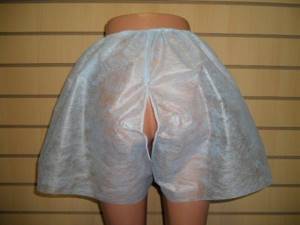
Attention! If there is an urgent indication for the procedure, you should not avoid it due to embarrassment. Menstruation is a natural process for a woman, which is accepted normally by doctors.

